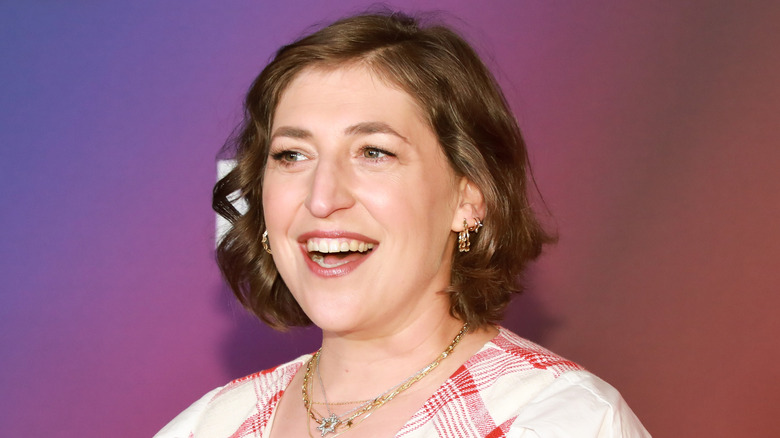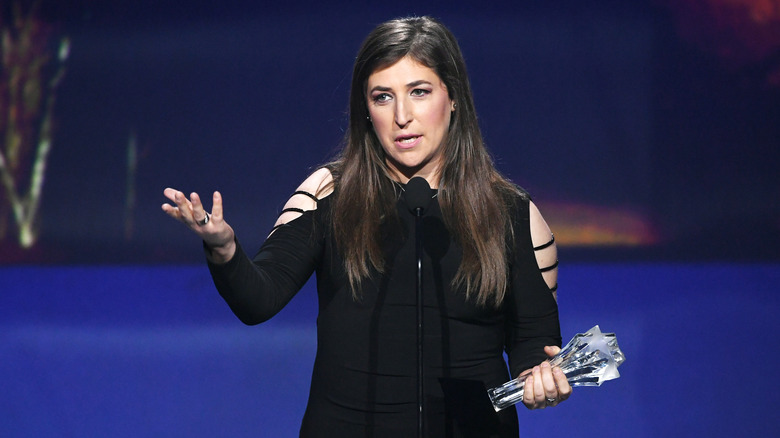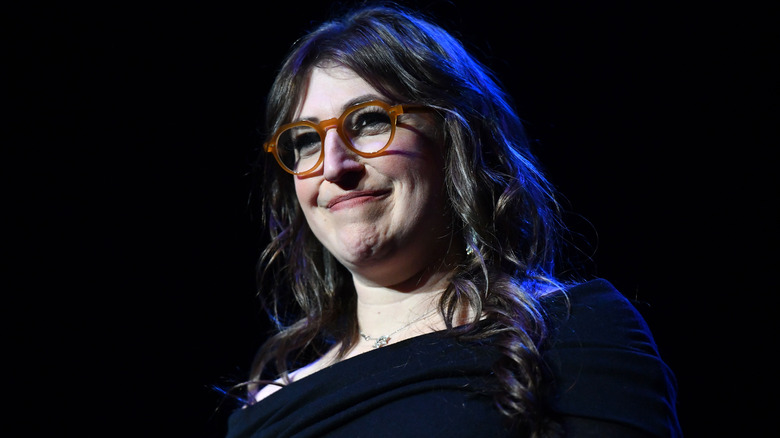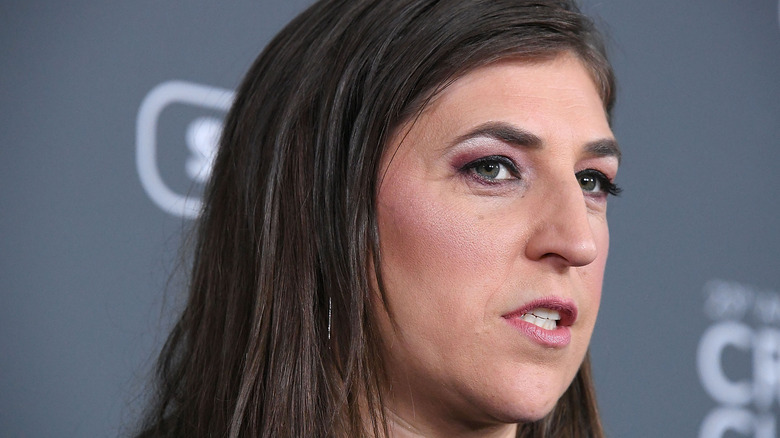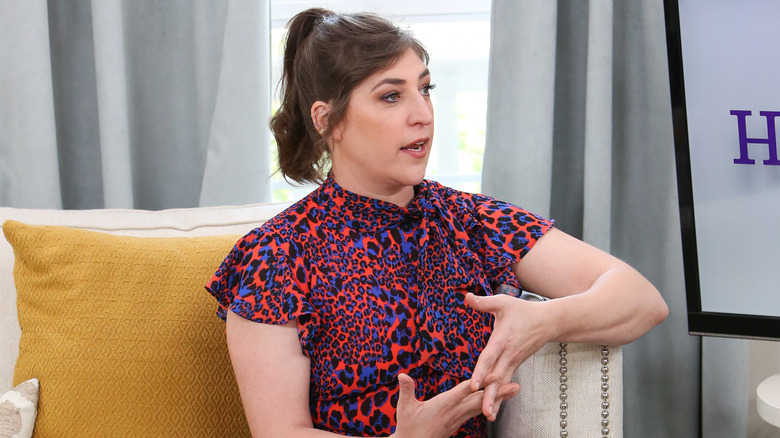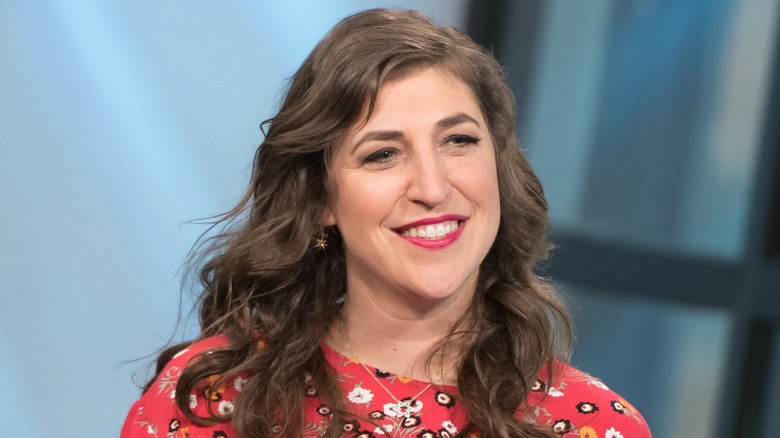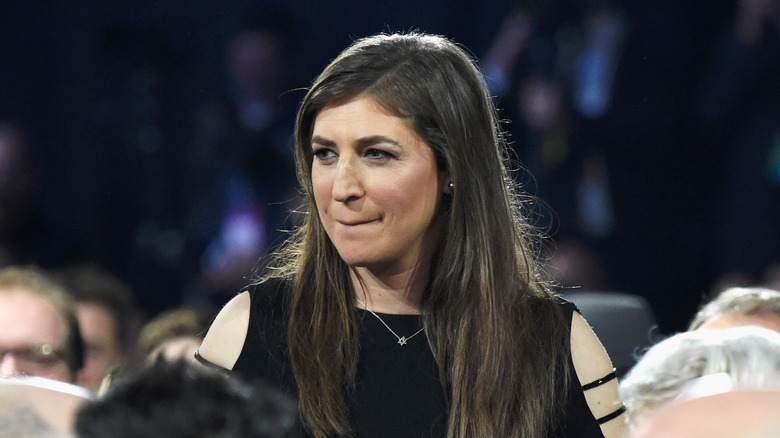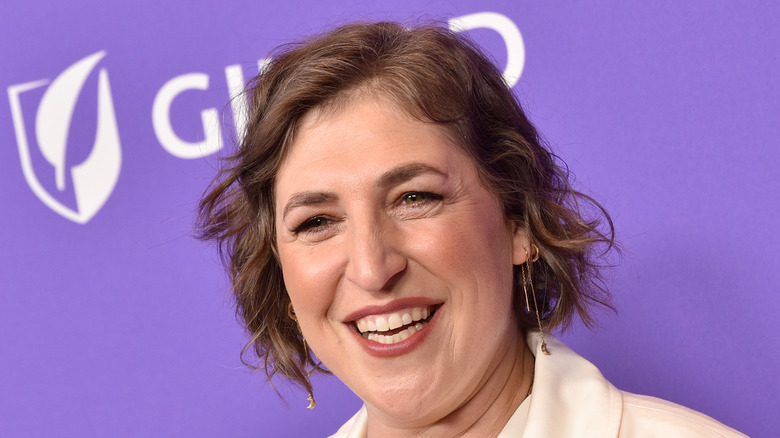The Shady Side Of Mayim Bialik
There's much to admire about Mayim Bialik, who's parlayed misfit characters into financial reward, first as the titular teen "Blossom" on the '90s NBC series, and then two decades later as Amy Fowler, the brainiac love interest of Sheldon Cooper in "The Big Bang Theory." Her double-whammy success defied the odds faced by similar oddball sitcoms, from "Square Pegs" to "Freaks and Geeks," which fared rather poorly (despite incubating the rise of Sarah Jessica Parker in the former and James Franco in the latter). Between milking those nerdvision heifers for all their worth, Bialik abandoned Hollywood for a neuroscience doctorate at UCLA, proving that even actors could expand skillsets beyond memorizing script lines.
Rewired by academia, Bialik has since taken her scientific outlook to the social sphere, commenting via her own podcasts on everything from childrearing to mental health. She also picked up another TV gig as a rotating co-host (with Ken Jennings) on the popular game show "Jeopardy!" — although despite her intellect, she admitted she'd bomb as a contestant. "First of all, answering things like that under pressure and with a timer is not gonna happen for me," she said on "Club Random." "It's hard!" But she's experienced pressure on other fronts, such as explaining herself after making controversial statements on issues like vaccinations and sexism. She's also faced scrutiny about her ethics on matters like her unorthodox parenting regimen and support of questionable medications. Evidently, scientific validation hasn't been enough to shield Bialik from vocal detractors, some of whom might label her shady.
Her feminism belied the implied sexism in 'The Big Bang Theory'
Given her accomplishments, it's not surprising that Mayim Bialik considers herself a feminist, although one that's hardly extreme. "A lot of people .... think feminists are all man-hating, no make-up wearing militants," she noted on Facebook. "We're not all like that!" Her moderation, however, didn't stop her from blasting shows like the hit Disney flick "Frozen," declaring it exposed young girls to sexist manhunting urges. "My issue is that this is a movie geared to small children who I don't think need to be focusing on that as the main driving plot of a movie, especially when it's not a literary or historically-based fairy tale," she wrote in Kveller.
Critics, however, have taken apart Bialek's show, "The Big Bang Theory," for its own particular brand of chauvinism. While some of them were mild in their criticism, believing that the B-type geeks could get away with sexist behavior on "adorkable" grounds, others were much harsher. In a Pop Culture Detective YouTube video, it's noted that "Adorkable misogynists are male characters whose geeky version of masculinity is framed as both comically pathetic and endearing. And it's their status as nerdy nice guys that then lets them off the hook for a wide range of creepy, entitled, and downright sexist behaviors." Despite its 12-season run, the series had plenty of detractors, who likely weren't sad when ratings dropped and the show ended in 2019. As one person told Newsbeat (via BBC), "I think it can be really misogynistic and can be quite sexist."
Mayim Bialik was roasted for promoting a suspect drug
Given her academic credentials in neuroscience, it's pretty obvious that Mayim Bialik is big on anything to do with the brain. With that in mind, in 2021, New Jersey-based health product manufacturer Reckitt Benckiser approached the celebrity to promote a new supplement called Neuriva Plus. Bialik claimed she first tested the product herself before coming on board. It wasn't long before she started promoting Neuriva Plus in commercials and advertorials. "I'm looking forward to educating others about the science behind Neuriva because supplements are truly not all created equally," she said in a release. "My hope is to inspire others to do more for their brain through a holistic approach and incorporate Neuriva into their daily health routine, just like it's become part of mine."
But the science behind the supplement was shaky, especially after an out-of-court settlement following a class action lawsuit earlier that year had Reckitt Benckiser retreating from a false claim that Neuriva was a clinically proven product created to improve memory. Bialik's public endorsement wouldn't have qualified as a scientific test — but a testimonial at best. "Testimonials are the weakest possible kind of scientific evidence," said neurologist and Hartford HealthCare Memory Care Center director Amy E. Sanders to Hartford Healthcare. It also didn't help that a year earlier, Psychology Today ridiculed the brain-enhancing properties of Neuriva, which contained a coffea arabica extract. "Yep, it's essentially an expensive cup of java in pill form," retorted the article.
She was accused of being an anti-vaxxer
Armed with a set of academic letters behind her name, it's easy to assume Mayim Bialik would quickly embrace the virtues of medical science. But she has certainly drawn a great deal of heat over the healthy well-being of her own children. In her 2012 book, "Beyond the Sling," Bialik admitted she was very cautions about rubber-stamp inoculations for her kids. "We made an informed decision not to vaccinate our children," she wrote. "But this is a very personal decision that should be made only after sufficient research, which today is within reach of every parent who seeks to learn about their child's health regardless of their medical knowledge or educational status."
That statement would haunt her nearly a decade later, when she landed the "Jeopardy!" co-hosting gig, while the U.S. was in the midst of a pandemic. With detractors blasting her for being hypocritical of vaccines, Bialik decided to set the record straight. While commenting that her kids haven't received every vaccine available, she drew the line on the coronavirus. "I want my immune system to have the best chance at fighting anything that comes its way, especially if that's COVID," she said on her podcast.
Still, she didn't entirely leave proponents of the jab off the hook. "I have a lot of questions about the vaccine industry, as do a lot of people," she said to Yahoo! "I have a lot of questions about the profits involved."
Mayim Bialik has shamed other women over revealing clothing
Mayim Bialik has long declared herself to be a feminist but in her own way. She's encouraged girls to enter STEM careers and spoken out in favor of safe abortions. "I am so proud to exist among young women, even though their feminism doesn't necessarily look like mine," she said to The New Feminist. "It's so important to be part of a larger movement." But if feminism involved women accenting their bodily attributes in the name of female empowerment, Bialik was having none of it. That's when she set her sights on singer Ariana Grande and her provocatively dressed body seen on billboards across the country in 2014. Bialik was also derisive of models posing for Levi's jeans and Victoria's Secret undergarments. "I know that society is patriarchal and women are expected to be sexy and sexually available no matter what we do in society, but I guess now I need to explain that to my sons?" she stated in her blog on Kveller.
Bialik indicated she had nothing personal against Grande and that humor was the driving force behind her blog. But she still took heat from a gaggle of opposing folks on social media. Noted one detractor on Twitter (now known as X), "Should the woman whose religion dictates she can't wear pants should be less judgmental about how others dress?" Tweeted a die-hard Grande fan, "She was actually wearing a 2 piece and you obviously aren't a fan so you wouldn't know that's her style. Mind your own business."
She also appeared to victim blame
Taking on Ariana Grande and models working for Victoria's Secret was one thing, but coming to terms with her own self-described social conservative version of feminism during the explosive days of the #Metoo movement was another. She had nothing but scorn for men who sexually assaulted women but opened herself up for attack for her modest choice of attire and non-flirtatious way of dealing with men in a 2017 op-ed she penned for The New York Times. "If you are beautiful and sexy, terrific," Bialik wrote in a piece called "Being a Feminist in Harvey Weinstein's World." "But having others celebrate your physical beauty is not the way to lead a meaningful life. And if — like me — you're not a perfect 10, know that there are people out there who will find you stunning, irresistible and worthy of attention, respect and love. The best part is you don't have to go to a hotel room or a casting couch to find them."
Feminists were furious. Model Emily Ratajkowski sarcastically tweeted, "So @missmayim 'advice' is: I was never pretty & never tried to be & ladies, take note if you don't want to be harassed? This isn't feminism." Bialik responded on X by claiming several women had taken her written words out of context. Four days later, she issued an apology to those she offended.
Mayim Bialik had issues with the Pill
Despite her social conservative perspective on the issues of the day, Mayim Bialik has occasionally gone against that grain when it came to women's rights, including safe access to abortions. But she was less generous toward the birth control pill, stating that women who took the contraceptive were more prone to suffer from mental illness. On one installment of her podcast "Mayim Bialik's Breakdown," she elaborated her viewpoint with Ricki Lake and Abby Epstein, on hand to promote "The Business of Birth Control," a documentary work in progress at the time. "It is a powerful drug with a lot of side effects and it is not a mood regulator," Bialik said about the pill. "Many women experience staggering depression, emotional ability, and something I'm concerned about is the stereotyping of women and their moods and even about PMS may actually be reflecting the hormonal manipulation of our systems."
A Kiera Butler op-ed in Mother Jones dumped on Bialik's assertions, claiming that birth control options for women were safe. Harsher criticism came from medical practitioners who saw the completed documentary, which Bialik heartily promoted on social media. OB-GYN Dr. Kameelah Phillips wasn't impressed over the project's excessive focus on the anguish of families who suffered from the loss of loved ones who took birth control pills. "That is extremely rare," she said on Today. "It focused mostly on a reality that is a very tiny reality when we compare the benefits of birth control."
She believes in attachment parenting
Mayim Bialik's perspectives on science and health have rubbed critics the wrong way. She was also criticized for her role as parenting influencer. Much of the criticism surrounds Bialik endorsing a philosophy called attachment parenting. Among other things, this parenting style discourages punishment of children, while espousing continued breastfeeding of children past toddlerhood and allowing them to co-sleep with parents until they're confident enough to occupy their own beds.
Bialik, who has written extensively on the subject, including in her controversial 2012 tome, "Beyond the Sling," said she'd prefer to tackle the subject on less hostile turf. "If I'm talking to girlfriends, if I'm talking to random people, and we're talking about parenting, I tell them what works for me and why," she said to UPI. "But a lot of people want to ask me things so that they can fight with me." But experts haven't been thrilled with Bialik's parenting style, especially with the co-sleeping part, something the American Academy of Pediatrics discourages.
Bialik pointed out one advantage to attachment parenting. "It's more about communicating your needs to your child and respecting his needs at the same time," she said to Green Child Magazine. Speculation has it that someone else's needs were ignored, as it's been suggested that the childrearing practice contributed to her divorce in 2012.

